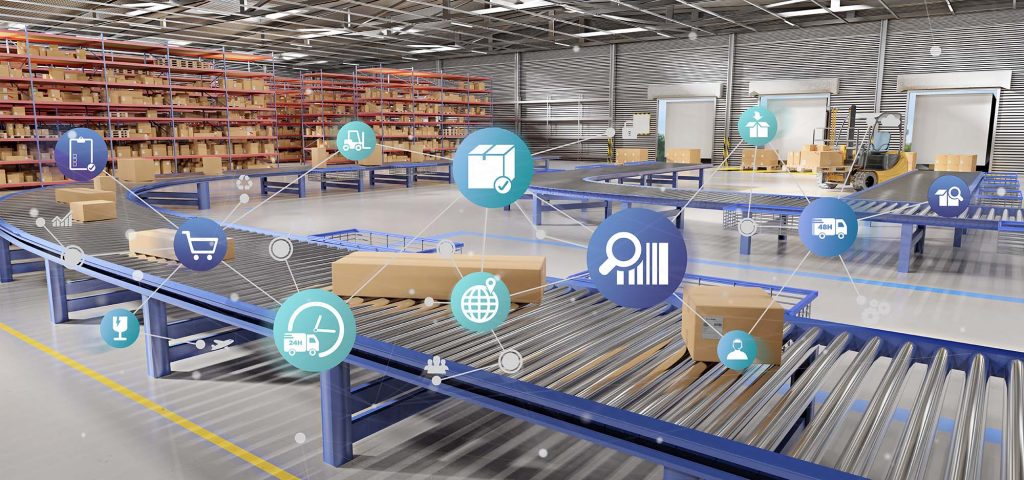Home > Logistics and distribution
LOGISTICS AND DISTRIBUTION
Data science and operational research can streamline your logistics systems
Probayes’ unique approach to logistics and distribution systems is based on broad, deep knowledge of data science. This positions us to be able to integrate predictive analysis of your systems into the processes used to optimize logistics chains.
Operational research and forecasting can be combined to create and implement robust management strategies.
These solutions are extremely versatile and can be used in a wide range of logistics and distribution scenarios.
Probayes’ approach effectively addresses the major concerns of logistics and distribution stakeholders:
- Configuring delivery and pickup routes and maintenance rounds
- Managing inventory and ordering
- Physical resource scheduling (managing fleets of machines, computers, rooms, etc.)
- Human resource scheduling (hospital staff, truck drivers, etc.)
- Supply chain design
- Transportation network design (passenger or freight)
- Yield management
Algorithmic forecasting tools
Probayes uses algorithmic forecasting tools as the basis for solutions that allocate available resources and determine whether or not external resources will be needed.
These algorithms generate reliable forecasts based on the information available at the time of the decision and on patterns regularly observed in the past.
Time series
Probayes continues to conduct research and development work on topics like forecasting counts of items like the number of containers to be supplied or the number of parcels to be delivered, for example, to develop algorithms better suited to this type of problem.
Algorithmic tools for operational research
The purpose of operational research is to arrive at the best possible decision among a potentially large number of alternatives.
Probayes’ operational researchers possess the know-how you need to build a decision-assistance tool that responds to your unique use case, from the expression of the problem to the operational implementation of an optimized solution:
Applied mathematics techniques
Used to model logistics systems and solve combinatorial and optimization problems (graph theory, linear programming, constraint programming, dynamic programming, matheuristics/metaheuristics).
Computer programming
Used to solve 1:1 scale problems within a reasonable time and with a limited use of machine resources (C++, Python) and to integrate the solver into the existing computer environment by creating the necessary gateways.
Better results, together
We work hand in hand with your business process experts
In logistics and distribution, a particularly complex industry, data usually comes from significant number of different sources. At Probayes, we work in close partnership with your business and process experts, ensuring clear communication and total transparency at every stage of the project. The goal is for us to get better results for you by working together throughout your project. Your people will gain knowledge of the methods used to implement AI solutions in the logistics and distribution industry, and our people will acquire a deep understanding of your business objectives and imperatives. This is how we build strong long-term partnerships.
Success stories

Optimnet
Optimnet is custom decision-assistance tool that adapts to your unique logistics system optimization needs.

Logistics chain optimization
Development of a tool to modify the input data and very rapidly generate and display the results.

Making hybrid vehicle engines more efficient
Definition of optimal hybrid engine management strategies for a given route
Optimnet project
Success story
France’s national postal service, La Poste, was facing rapidly-increasing demand for parcel delivery services. The organization was looking for a way to transform its delivery route design system, a large and complex ecosystem made up of many interconnected national and regional lines. La Poste turned to Probayes for support with the transformation, which came in the form of a custom decision-assistance tool used to test scenarios and explore new ways to improve the network.
Challenge
Each problem is broken down into three steps:
- The future parcel delivery network is modeled
- The routing solution is optimized by determining the specific route for each parcel (stopovers, routes), the logistics operations completed (sorting, cabotage), the types of vehicles used, and the delivery time
- The tool can be used to complete simulations on a regular basis to test new scenarios, based on predicted volumes, the characteristics of the logistics chain (sites, interconnections), and economic hypotheses.
The project
Probayes’ operational research team worked on all three of these steps:
- They modeled the parcel distribution network using a linear mathematical model tailored to the use case being addressed and integrating the different possible improvements to the network, which were determined with experts from La Poste. The models can have more than 1 million variables and more than 20,000 constraints, depending on the number of sites involved and the routing strategies considered.
- A program was implemented in C++ for the construction of mixed linear programs, solved with a commercial solver, and the reconstruction of the solutions
- A simulator was developed for users to configure scenarios, run simulations, display the optimized solutions, and compare the results based on a number of indicators. The web-based graphical user interface was developed in Python
Results
The tool produces optimized solutions (within 5% of optimal) in less than ten minutes. The average transportation-related savings at the national level are between 5% and 20% per day. Initial testing of new scenarios generated several promising potential improvements to the network. The simulator is now available to the Colissimo parcel delivery service division of La Poste for testing.
A funded PhD dissertation in cooperation with G-SCOP Lab should result in enhancements to the resolution methods used. The tool will then be able to generate even more effective solutions and handle an even greater number of variables, still within a reasonable amount of time.
“Lorem ipsum dolor sit amet, consectetur adipiscing elit. Fusce eu lacus diam. Cras congue, neque ac mattis efficitur, nibh ipsum fringilla nunc, sed iaculis neque odio non orci. Vestibulum ante ipsum primis in faucibus orci luctus et ultrices posuere cubilia Curae; Praesent lacinia, urna quis rhoncus lobortis, urna neque tempus tellus, quis auctor justo lectus vitae libero. Nulla non porta odio. Donec diam est, varius id ullamcorper a, efficitur nec libero”
First name Last name
Position – Company
Register for a webinar or watch the recordings

Artificial intelligence, the power to transform logistics systems
Logistics and distribution and, especially, parcel delivery, is under increasing pressure.
Logistics service providers depend on physical vehicles and transportation networks, of course. But they also need digital tools to respond to often conflicting demands to handle large volumes, remain profitable on razor-thin margins, and work to tight deadlines.
By nature, the logistics industry is highly networked, making it an ideal candidate for solutions built on artificial intelligence. Many logistics and distributio companies have already made the leap.
Our customers*













































*We take confidentiality seriously. Some of our customers’ names and other identifying information have been removed.

Copyright 2019 – Probayes – 53 avenue Kuntzmann – 38330 Montbonnot – France – Tel: +334 76 42 64
